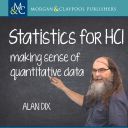A pragmatic way of thinking about probability: it doesn’t matter what probability ‘really’ is, so long as it satisfies the right mathematical rules. In particular, Bayesian statistics encodes beliefs as values between 0 and 1, which satisfy the rules of probability (Kolomogrov laws). This encoding (belief) as probability is sometimes called plausibility or reasonable expectation). Contrast with frequentist and idealist.
Also used in hcistats2e: Chap. 1: page 8
